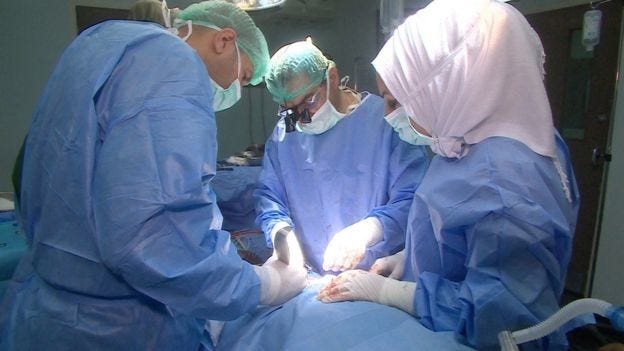Organs, Weapons, and Weed
When governments prohibit economic activities, underground economies often pop up. These range from black markets for officially prohibited items like military-issue weapons to gray markets serving shoppers wanting to avoid regulations.
One of the most controversial underground economies is the market for organs. In 2013, for instance, five Kosovars, including a urologist and an anesthesiologist, were convicted for trafficking in organs sourced from desperately poor individuals. According to the New York Times, “many were never given any compensation and were released without adequate medical care.” A Turkish surgeon connected to the case, known as “Dr. Frankenstein” in the Turkish media, remains free. In Europe, organ trafficking has also arisen in connection with the refugee crisis. Migrants who can’t pay for their journey have been murdered for their organs, which can make the traffickers €15,000.
One of the most controversial underground economies is the market for organs.
And sadly, organ trafficking is not confined to Europe. For example, according to the BBC, Iraq has become “a new hub for the organ trade across the Middle East.” Poverty has driven Iraqis to selling their organs illegally. A kidney can go for $10,000 dollars. Similar practices are reportedly widespread in India, Pakistan, the Philippines, and Egypt as well.
Some of the most gruesome tales of organ harvesting come from China. A report by human rights activists released this summer claimed that there are as many as 100,000 transplants a year in the country, and many of the organs are harvested from the bodies of executed political prisoners. The government only officially acknowledges 10,000 transplants per year. Beijing is trying hard to convince the world that it has stopped the practice, but not everyone is persuaded.
Some believe that the prohibition on organ sales is immoral, since it creates artificial scarcity and therefore costs lives. Others are skeptical, arguing that the poor would effectively be coerced into selling pieces of their bodies. For better or worse, as long as people with healthy organs need cash and people with cash need healthy organs, underground markets will likely pop up.
The black market for weapons is another highly consequential underground economy. Just look at Ukraine. Thanks to the conflict between the government and separatists, the country “has turned into a supermarket for illegal weapons.” Smuggling is on the rise, and concerns are growing that there could be a glut of weapons leaving the country when the conflict is over. And look at what happened in Libya, where the fall of Qaddafi’s regime led to a massive outflow of weaponry that flooded Mali and Nigeria.
In Somalia, it’s believed that as much as 40% of the guns the government imports are ending up on the black market. And in Iraq, hundreds of thousands of weapons the US issued during the war are now circulating, unaccounted for. According to the New York Times, “the effectively bottomless abundance of black-market weapons from American sources is one reason Iraq will not recover from its post-invasion woes anytime soon.”
Underground markets for non-prohibited goods also pop up to skirt restrictions on how they are traded. Just look at what’s happening as marijuana is legalized in the United States. In our nation’s capital, for instance, recreational use is allowed, but non-medical sales are not.
The result: “a gray market...sprung up in the city, daring entrepreneurs to accept ‘donations’ to various causes in exchange for gifts of pot or even engage in straight up bartering for the plant,” according to the Washington Post.
Likewise, because the federal government still considers marijuana an illicit drug, businesses in states like Colorado, where non-medical sales are legal, cannot access banking services, and have to deal in cash. These activities are not strictly illegal, but clearly operate in a gray area.
Similar gray-area situations include parallel markets for paper money in countries upholding currency pegs. In places affected by political and economic turmoil—including Nigeria, Egypt, Angola, and Uzbekistan—the street prices of currencies regularly diverge from official prices when governments try to manage their value. There is little incentive to buy at the unattractive official rate when peddlers may offer significantly more local currency for a foreigner’s dollar.
We tend to think of markets as the open, above-ground institutions described in economics classes. But we miss a lot by ignoring the shadow economies that exist all over the world. European countries found this out when they added illicit activities to their national accounts, boosting the GDPs of Italy and Spain by roughly one percent. To navigate uncertainty in today’s complex, interconnected world, we must avoid ignoring phenomena like underground markets that may not fit into our standard framework.
Vikram Mansharamani is the President of Kelan Advisors, LLC and the author of Boombustology: Spotting Financial Bubbles Before They Burst(Wiley, 2011). To learn more about him or to subscribe to his free mailing list, visit his website. He can also be followed on Twitter @mansharamani or by liking his Facebook page.







